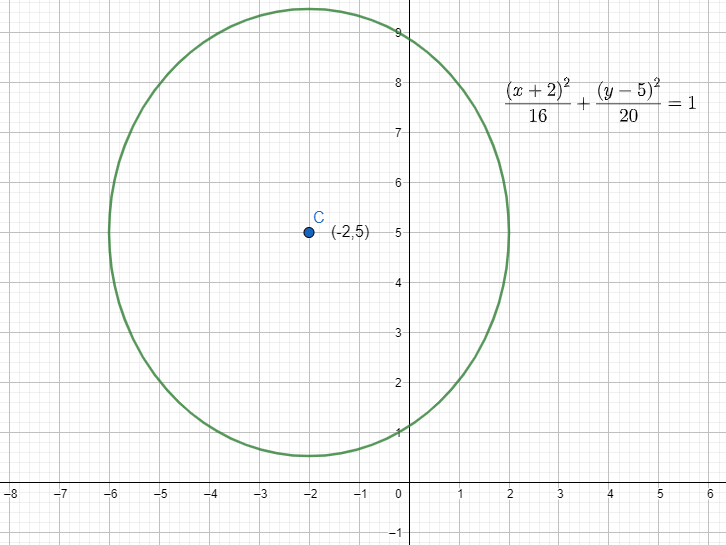Question
Question: How do you graph the ellipse \(\dfrac{{{\left( x+2 \right)}^{2}}}{16}+\dfrac{{{\left( y-5 \right)}^{...
How do you graph the ellipse 16(x+2)2+20(y−5)2=1 and find the center, the major and minor axis, vertices, foci and eccentricity?
Solution
In this question we have been asked to find the center, the major and minor axis, vertices, foci and eccentricity of the given ellipse 16(x+2)2+20(y−5)2=1. We know that the general form of an ellipse is a2(x−h)2+b2(y−k)2=1 , where (h,k) is the center of the ellipse, the major axis is given by 2a and the minor axis is given by 2b, the vertices are (h±a,k) and (h,k±b), eccentricity e=1−b2a2 and the foci are (h,k±be).
Complete step-by-step solution:
We have the ellipse given to us as:
⇒16(x+2)2+20(y−5)2=1
We can write the term 16=42 and 20=25 therefore, on substituting, we get:
⇒42(x+2)2+(25)2(y−5)2=1 which is in the general form a2(x−h)2+b2(y−k)2=1.
The center is given as (h,k) which is (−2,5).
The major axis will be:
⇒2b=2×25=45
Now the minor axis will be:
⇒2a=2×4=8
The vertices are (h±a,k) and (h,k±b) therefore, on substituting, we get:
⇒(−2±4,5) and (−2,5±45)
The eccentricity is given by: e=1−b2a2.
On substituting the values, we get:
e=1−(45)242
On simplifying the roots, we get:
e=1−2016
On taking the lowest common multiple, we get:
e=2020−16
On simplifying, we get:
e=204
On simplifying, we get:
e=51
Which can be written as:
e=51
The foci are (h,k±be)
On substituting the values, we get:
⇒(−2,5±(25×51))
Which can be simplified and written as:
⇒(−2,5±2)
Which are (−2,7) and (−2,3).
On drawing the ellipse on the graph, we get:

Note: The major axis of the ellipse represents the axis which is longer, in this case the y axis and the minor axis represents the axis which is smaller, in this case the x axis. b represents the major axis and a represents the minor axis. It is to be noted that in this case we have with us a vertical ellipse since b>a. If $a
